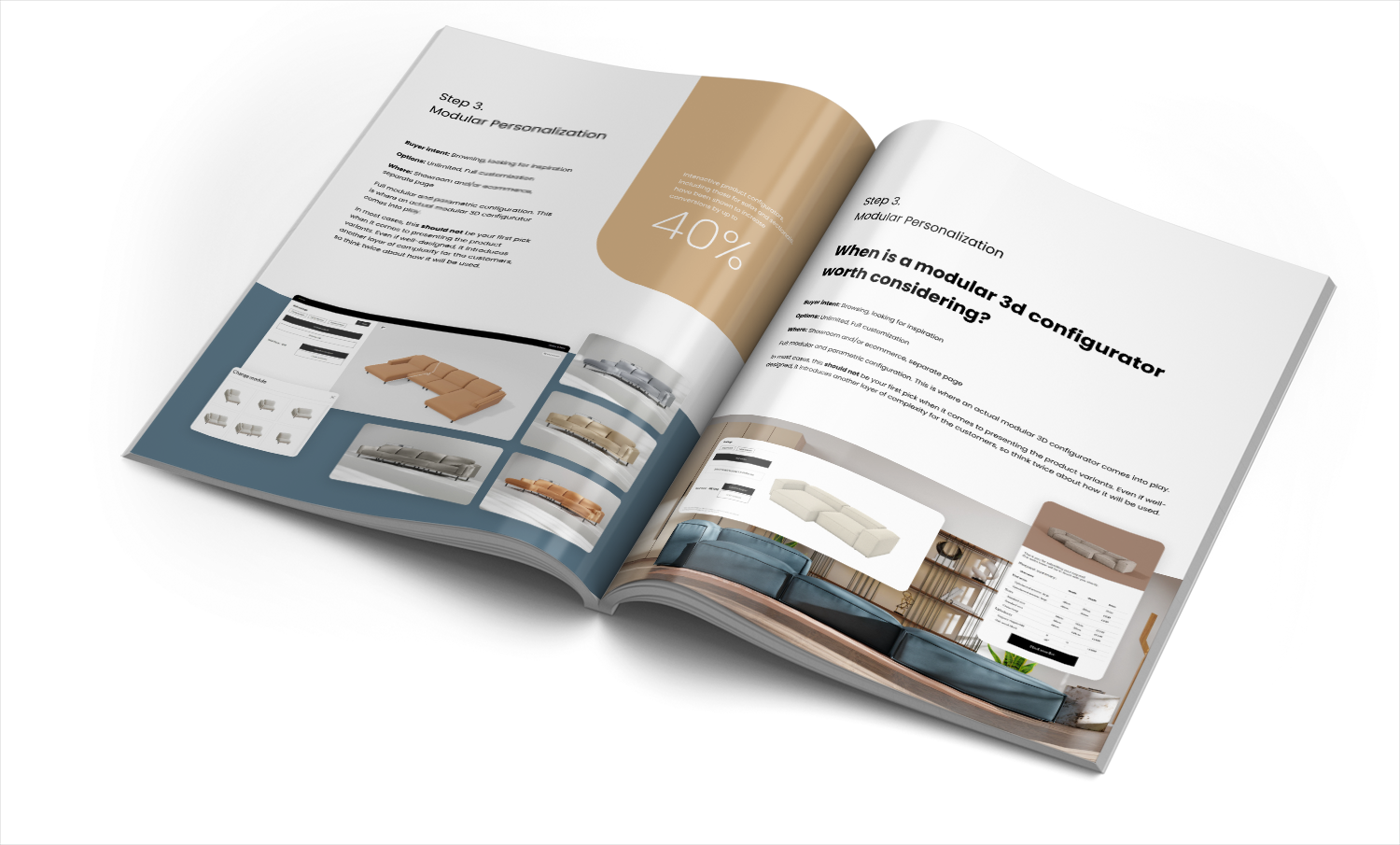The Ultimate 2025 Sofa Configuration Guide
Get your free copy todayy!

Complex product offerings, high customer expectations for visuals, and the relentless demand for fresh content put furniture manufacturers and retailers under constant pressure. A key question is whether the visuals produced for your product configurator—variant renders or 3D images—can also serve double duty as assets for marketing campaigns, social media, and ads. The answer isn’t just “yes”—it’s that reusing configurator visuals is often the most strategic move you can make. Here’s how turning product visuals into a content engine directly addresses your operational headaches.
If you’re relying on lifestyle photography for every product or variant you sell, you’re fighting a losing battle with cost and timelines. Booking photographers, staging new fabrics or finishes, and then waiting for post-production is slow and expensive. Worse, it’s nearly impossible to keep all marketing channels visually in sync with your actual product catalog—especially as variants and options expand.
Automated variant visuals, rendered as part of your configuration or personalization process, can be instantly repurposed as high-quality marketing and ad content. Each approved combination is photorealistic, accurate, and 100% consistent with what’s shown in your webshop. If a customer can design it, you can feature it—no need for ad-hoc photoshoots.
This approach relates closely to insights from How Many Images Do I Need Per Product Variant?, which explains how automated variant image generation tied to ERP and webshop systems not only improves buyer confidence but also streamlines your marketing asset pipeline.
For one Polish furniture brand, integrating a variant automation system cut their content production cycle by 80%. Visuals used during product configuration were auto-synced to their CMS and marketing scheduler, enabling real-time campaign launches around new finishes or limited editions.
Running flash sales, promoting new options, or personalizing follow-ups with relevant visuals is nearly impossible if your design or photo team can’t keep up. Customers miss out on seeing “their” product in retargeting ads or emails, leading to wasted opportunities and higher acquisition costs.
Because configurator visuals are automatically generated for every product variant, marketing teams have immediate access to a library of on-brand, campaign-ready images. This unlocks personalized email flows (“Here’s what you designed!”), dynamic retargeting ads, and just-in-time content for social media. You move as fast as the market demands—no creative bottlenecks.
This benefit is supported by strategies outlined in How to Use Configurator Analytics to Improve Marketing Campaigns, where tracking configurator interactions enables precise, personalized marketing that reduces acquisition costs and boosts conversion rates.
A German online retailer started using auto-generated renders of bestseller sofas. Within three months, they doubled their ad creative output and lowered their social media cost-per-click by 27%—all by quickly deploying dozens of personalized variant visuals per campaign.
Customers bounce between mobile, desktop, and physical showrooms. When your Facebook ad, e-commerce page, and in-store kiosk display different product visuals, trust drops and you run the risk of order errors or returns.
By building marketing assets directly out of your configurator’s image library, every channel uses the exact same images as your sales and checkout process. Customers see “what you see is what you get” at every touchpoint, improving trust and reducing costly misunderstandings.
This aligns with the challenge addressed in Can I Use the Same Configurator Online and in Showrooms?, advocating for unified configurator platforms to ensure consistent visuals and pricing across digital and physical channels, thereby boosting customer confidence and loyalty.
| Process | Without Configurator Visuals | With Configurator Visuals |
|---|---|---|
| Social media campaigns | Manual photoshoots, months of planning | One-click export, personalized in seconds |
| Ad retargeting | Stock or generic images, low relevance | Dynamic, customer-specific variant visuals |
| New product launch | Slow asset creation, inconsistent looks | Simultaneous go-live with site visuals |
| Customer emails | Text-heavy, static offers | Automated, visual follow-ups |
Design and content teams often spend valuable time generating “just one more variant” for marketing assets, doing manual Photoshop edits, or hunting for past visuals. This work is tedious, introduces errors, and adds zero strategic value.
An automated image generation system creates an organized, searchable library of all valid product variants. Marketing can pick and deploy visuals as needed, freeing your design team to focus on higher value creative work.
This theme complements recommendations from How Should I Prepare 3D Models for Visual Automation?, emphasizing the importance of standardized, high-quality 3D assets and streamlined workflows to ensure timely delivery of consistent visuals across marketing and sales channels.
An Italian bed manufacturer reduced their ad production time by 70%, boosting their marketing team’s productivity and enabling faster A/B testing of creatives for a measurable increase in campaign performance.
Configurator visuals are no longer a “webshop-only” tool. The brands seeing the fastest marketing growth are those leveraging these assets across every customer touchpoint—ads, social posts, CRM campaigns, and even offline handouts. This approach isn’t just about efficiency; it’s about building trust, increasing relevance, and scaling your revenue without scaling your headcount.
This comprehensive utilization reflects best practices described in Can I Generate Marketing Visuals from My Configurator Data?, which advocates for seamless integration of configurator outputs into marketing workflows to eliminate bottlenecks and unleash team creativity.
Ready to make your product visuals work harder—across sales and marketing? Schedule a free, 30-minute consultation to see how automated variant visuals can plug directly into your ad and social workflows, eliminating bottlenecks and unleashing your team’s creativity.